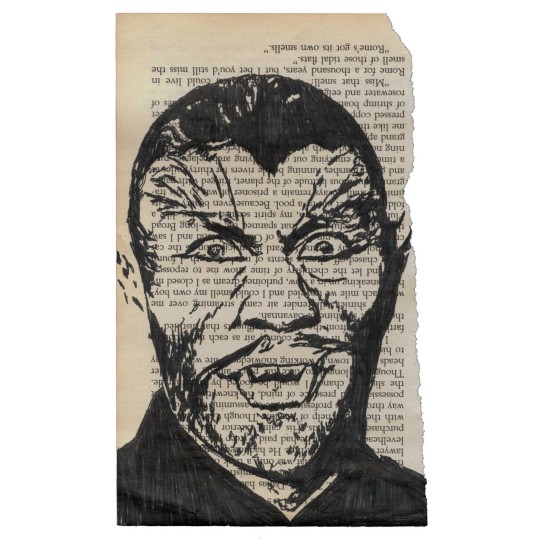#modern poverty
Note
You've mentioned before that the lowest rung of the nobility tended to fight the hardest against extending the privileges of classes lower than them because they feared that it would erode their own privileges. Could fascism and other reactionary movements enjoying their greatest support among small rural landowners and the urban middle class be seen as a modern version of this?
There is a particular form of ressentiment that is unique to the middling classes, who envy and resent those above them for their wealth, privilege, and power and simultaneously hate and fear those below them out of a belief that the lower orders will take the small amounts of wealth, privilege, and power that the middling classes have managed to acquire through crime, revolution, or the welfare state.
And it's been at the core of reactionary politics since Putney and the Enlightenment. As I've written about before, the lowest-ranked nobles were particularly squeezed by the Price Revolution and the rise of the bourgeoisie, and a lot of the "noblesse d'epee" clung fiercely to their feudal privileges (and deeply resented new money bourgeois buying their way into the "noblesse de robe") because those feudal privileges were the only things that distinguished them from peasants.

And likewise, during the 19th and 20th century, a lot of small farmers and shopkeeps and small businessmen who were being squeezed by the Industrial Revolution and the advent of capitalism were persuaded by anti-Enlightenment reactionary propaganda that the true threat to their clinging-on-to-respectability-by-their-fingernails material standards of living was Enlightenment liberals, Jacobin radicals, and later socialists and Jews - hence why Baubel and Marx called anti-semitism the "socialism of fools."
And it never really went away...
#history#intellectual history#social history#ressentiment#noblesse d'epee#genteel poverty#early modern history#enlightenment#french revolution#fascism
54 notes
·
View notes
Text
hm. i think anyone born after 1995 and raised on an excessively curated media landscape where everything is polished and perfect, when they first actually engage with the meat of the classics (so called) after years of indirect exposure… there’s a moment of being struck by the sincerity. by the humility. you know. this was written for a tiny stage. it really is just five people in a room, talking. it’s about a boy trying to make rent. this story is small. the author was a peasant’s son.
#like the absence of human mess and poverty in modern books#you read Dostoevsky you can tell he didn’t go to Harvard#I hate MFAs lmao
16 notes
·
View notes
Text
When youre working on your thesis about development aid, stressed tf out and feeling absolutely terrible and then you have a clear moment while reading about how many people dont have access to proper sanitation, clean water, food, education etc.
Now it feels ridiculous to feel bad while wearing a 250€ jacket and munching on snacks as someone who never suffered true poverty. This world is so fucked really. This insane disparity between people buying birkin bags and people starving....
#and then theres billionaires#how do people live with billions on their bank accounts while other people are drying from poverty?????#modern day scrooges
14 notes
·
View notes
Text
Just read that, in the early 18th century, labouring poor families living hand-to-mouth through a variety of casual, seasonal work, charity and a small amount of “parish relief” (“Poor Relief” in 18th century Britain was the the equivalent of social security, still primarily provided as “outdoor relief” in people’s own homes in that period, but paid on a local basis collected from the rates paid in each parish) were known as “living in the economy of makeshifts”.
And fucking hell, if that isn’t a far better description of the way so many people are living right now than “polywork” or any of the other cutesy euphemisms the right-wing press keep trying to trot out.
#poverty#disablity#early modern history#18th century#working class history#poor relief#social security#economy of makeshifts#polywork and other bs euphemisms
20 notes
·
View notes
Text
lol so many men are really convinced that they're the prize, i saw a woman's post about the 4b movement and men in the comments are like "don't be so picky, you'll end up alone" yes that's literally the point. men are so unbearable as a group that tons of heterosexual women would rather refrain from romantic relationships entirely than date one of them.
this kind of thing is old hat at this point, but it's funny to see men acting like this at the same time that we are supposedly facing a "male loneliness epidemic." the idea of being single and lonely is something with which to threaten noncompliant women, but when a man can't find a woman to have sex with him and do his laundry, it's a crisis.
#they complain about modern women being brainwashed by feminism#guess what women in the past didn't like being mistreated either but they had to find a man or live in poverty and be socially ostracized
10 notes
·
View notes
Text
Dorsal Atlântica - God Complex
#Dorsal Atlântica#Straight#God Complex#Full-length#Release date:#1998#Genre:#Speed Metal#Thrash Metal#Hardcore/Crossover#Themes:#Modern society values#Poverty#Spirituality#Brazil
6 notes
·
View notes
Text
beginning to see american "if you dont vote for the blue warmongerers then you are personally responsible for the red warmongerers getting into power"

#it is so frustrating seeing americans play morals about what party is “harm reduction” when you know sure as hell#that both of them do the same shit#both parties destroy the stability and peace of global south nations for profit. both parties invest so much in global north countries#to encourage allyship and reliance so to never break that allyship. biden is FUNDING GENOCIDE RIGHT NOW.#both parties kill kids. both parties support modern day slavery. both parties pollute our earth and blame it on india and china#and (cus i know your average white american lib doesnt care about the rest of the world)#both parties make the usa a living hell for marginalized ppl. look at how badly indigenous and lgbt rights have been eroded over these 4 yr#look at what is happening at the us/mexico border. look at student loans. look at poverty.#they sat there and did nothing as roe vs wade was destroyed in front of their eyes.#its not harm reduction when both parties are doing the same harm but one of them is just being nicer about it#it is chickens voting for their butcher
13 notes
·
View notes
Text
It is August 1854, and London is a city of scavengers. Just the names alone read now like some kind of exotic zoological catalogue: bone-pickers, rag-gatherers, pure-finders, dredgermen, mud-larks, sewer-hunters, dustmen, night-soil men, bunters, toshers, shoremen. These were the London underclasses, at least a hundred thousand strong. So immense were their numbers that had the scavengers broken off and formed their own city, it would have been the fifth-largest in all of England. But the diversity and precision of their routines were more remarkable than their sheer number. Early risers strolling along the Thames would see the toshers wading through the muck of low tide, dressed almost comically in flowing velveteen coats, their oversized pockets filled with stray bits of copper recovered from the water's edge. The toshers walked with a lantern strapped to their chest to help them see in the predawn gloom, and carried an eight-foot-long pole that they used to test the ground in front of them, and to pull themselves out when they stumbled into a quagmire. The pole and the eerie glow of the lantern through the robes gave them the look of ragged wizards, scouring the foul river's edge for magic coins. Beside them fluttered the mud-larks, often children, dressed in tatters and content to scavenge all the waste that the toshers rejected as below their standards: lumps of coal, old wood, scraps of rope.
Above the river, in the streets of the city, the pure-finders eked out a living by collecting dog shit (colloquially called “pure”) while the bone-pickers foraged for carcasses of any stripe. Below ground, in the cramped but growing network of tunnels beneath London's streets, the sewer-hunters slogged through the flowing waste of the metropolis. Every few months, an unusually dense pocket of methane gas would be ignited by one of their kerosene lamps and the hapless soul would be incinerated twenty feet below ground, in a river of raw sewage.
The scavengers, in other words, lived in a world of excrement and death. Dickens began his last great novel, Our Mutual Friend, with a father-daughter team of toshers stumbling across a corpse floating in the Thames, whose coins they solemnly pocket. “What world does a dead man belong to?” the father asks rhetorically, when chided by a fellow tosher for stealing from a corpse. “'Tother world. What world does money belong to? This world.” Dickens' unspoken point is that the two worlds, the dead and the living, have begun to coexist in these marginal spaces. The bustling commerce of the great city has conjured up its opposite, a ghost class that somehow mimics the status markers and value calculations of the material world. Consider the haunting precision of the bone-pickers' daily routine, as captured in Henry Mayhew's pioneering 1844 work, London Labour and the London Poor:
It usually takes the bone-picker from seven to nine hours to go over his rounds, during which time he travels from 20 to 30 miles with a quarter to a half hundredweight on his back. In the summer he usually reaches home about eleven of the day, and in the winter about one or two. On his return home he proceeds to sort the contents of his bag. He separates the rags from the bones, and these again from the old metal (if he be luckly enough to have found any). He divides the rags into various lots, according as they are white or coloured; and if he have picked up any pieces of canvas or sacking, he makes these also into a separate parcel. When he has finished the sorting he takes his several lots to the ragshop or the marine-store dealers, and realizes upon them whatever they may be worth. For the white rags he gets from 2d. to 3d. per pound, according as they are clean or soiled. The white rags are very difficult to be found; they are mostly very dirty, and are therefore sold with the coloured ones at the rate of about 5 lbs. for 2d.
The homeless continue to haunt today's postindustrial cities, but they rarely display the professional clarity of the bone-picker's impromptu trade, for two primary reasons. First, minimum wages and government assistance are now substantial enough that it no longer makes economic sense to eke out a living as a scavenger. (Where wages remain depressed, scavenging remains a vital occupation; witness the perpendadores of Mexico City). The bone collector's trade has also declined because most modern cities possess elaborate systems for managing the waste generated by their inhabitants. (In fact, the closest American equivalent to the Victorian scavengers – the aluminium-can collectors you sometimes see hovering outside supermarkets – rely on precisely those waste-management systems for their paycheck.) But London in 1854 was a Victorian metropolis trying to make do with an Elizabethan public infrastructure. The city was vast even by today's standards, with two and a half million people crammed inside a thirty-mile circumference. But most of the techniques for managing that kind of population density that we now take for granted – recycling centers, public-health departments, safe sewage removal – hadn't been invented yet.
And so the city itself improvised a response – an unplanned, organic response, to be sure, but at the same time a response that was precisely contoured to the community's waste-removal needs. As the garbage and excrement grew, an underground market for refuse developed, with hooks into established trades. Specialists emerged, each dutifully carting goods to the appropriate site in the official market: the bone collectors selling their goods to the bone-boilers, the pure-finders selling their dog shit to tanners, who used the “pure” to rid their leather goods of the lime they had soaked in for weeks to remove animal hair. (A process widely considered to be, as one tanner put it, “the most disagreeable in the whole range of manufacture.”)
We're naturally inclined to consider these scavengers tragic figures, and to fulminate against a system that allowed so many thousands to eke out a living by foraging through human waste. In many ways, this is the correct response. (It was, to be sure, the response of the great crusaders of the age, among them Dickens and Mayhew.) But such social outrage should be accompanied by a measure of wonder and respect: without any central planner coordinating their actions, without any education at all, this itinerant underclass managed to conjure up an entire system for processing and sorting the waste generated by two million people. The great contribution usually ascribed to Mayhew's London Labour is simply his willingness to see and record the details of these impoverished lives. But just as valuable was the insight that came out of that bookkeeping, once he had run the numbers: far from being unproductive vagabonds, Mayhew discovered, these people were actually performing an essential function for their community. “The removal of the refuse of a large town,” he wrote, “is, perhaps, one of the most important of social operations.” And the scavengers of Victorian London weren't just getting rid of that refuse – they were recycling it.
— The Ghost Map: The Story of London's Most Terrifying Epidemic - and How it Changed Science, Cities and the Modern World (Steven Johnson)
#book quotes#steven johnson#the ghost map#the ghost map: the story of london's most terrifying epidemic - and how it changed science cities and the modern world#history#sanitation#waste management#recycling#economics#poverty#employment#labour#sociology#homelessness#welfare#authors#britain#victorian britain#england#london#thames#mudlarks#toshers#tanners#charles dickens#henry mayhew
49 notes
·
View notes
Video
youtube
I thought this was an interesting video in its own right, but also a useful resource for anyone who wants to write fic of Elspeth and Wee Morag surviving on the streets -- this video is focused on the Colonies in the late 1700s but most of these jobs would have also existed in the UK.
TL;DR list:
-Scavenger (sorting garbage for scraps to sell)
-Rag-picker (similar; bits of leather sold to shoemakers or fabric sold to make paper)
-"Pure" finder (collects dog poo off the streets for the tanners; often done by small children)
-Ash collector
-Leech collector (wade into water to let leeches attach to you)
-Bone drubber (collected bones to sell to bakers as fillers for bread)
-Night Soil crew (cleaning out outhouses + collecting solid waste; very dangerous)
-Chamberlye (collecting dried urine from chamberbots + selling it)
...tbh I would consider digging up bodies too if these were my job options D:
#history#poverty#townsends#good omens#edinburgh 1827#elspeth and wee morag#history is gross#let's all take a moment to appreciate our modern sewage systems#and the fac that we don't have piles of garbage and poo all over the streets
6 notes
·
View notes
Text
The migrant crisis in Latin America is the consequences of the Capitalist Modernity
Those people that are fleeing their land at thousands, if not millions, are met with the military and oppressive apparatus of the “first-world”, the “north-world”, European countries letting people die in the seas of the Mediterranean sea so they don’t get to the borders of the south Europe or the concentration camps in the Mexico-US border where agents of ICE and the United States Border Patrol behave as Gestapo agents by leaving people without food or any human care as they are caged – even children are separated from their families. This happens due to the eugenicist mentality of this countries, their white policies that had origin in the colonisation and the bases of the creation of the nation-state mentality.
#refugees welcome#migration#migrants#latin america#capitalism#poverty#capitalist modernity#oppression#military#firstworld#northworld#fortress europe#europe#european#countries#mexico#usa news#usa#ausgov#politas#auspol#tasgov#taspol#australia#ice#gestapo#eugenics#white policies#racism#fascism
6 notes
·
View notes
Text
youtube
Sometimes I make funny things-
#modern au where PJ apologises for plunging his kingdom into poverty with a youtube video#his 'team' is Sir Hiss begging him to put down the lute#prince john#robin hood#disney robin hood#Youtube
14 notes
·
View notes
Note
I’m the Middle Ages, we’re their likely any instances where the local “lord” (or equivalent) was poorer than some of the people under his lordship, like a landed knight being poorer than the local wealthy yeoman? I suppose, if so, intermarriage would be the likely resolution?
So if you look through my tag on "genteel poverty," you can certainly see that this was a phenomenon that cropped up during the Late Middle Ages and really took off during the Early Modern period due to the price revolution. However, it might be more likely to happen with regards to the local wealthy merchant than the local yeoman, since it was easier for the upwardly mobile to make their fortune in commerce than in agriculture.
Intermarriage was one resolution, being forced to gradually sell off land was another, but in moments of broader crisis other options like burning down the manor house or the house of the uppity merchant also became possibilities. People did have a way of taking advantage of larger phenomena to settle local scores.
26 notes
·
View notes
Text
"The real face of civilized society is one of violence, lies, deception, vulgarity, conspiracy, wars, enslavement, annihilation, servitude, treachery, seizure, looting, immorality, disrespect for the law, adoration of power, distortion and abuse of what is sacred and divine -- all for the benefit of a rapist and gender discriminatory elite. It is a society where some have access to everything while others are hungry and poor. The result is that society is brimming with slaves, strayed villagers and unemployed workers."
Abdullah Öcalan (author, Manifesto for a Democratic Civilization, 2015)
#writeblr#writing#capitalism#civilization#inequality#abdulla ocalan#democracy#writing advice#anitcapitalism#vulgarity#conspiracy#eastern civilization#western civilization#civilized society#poverty#economics#worldbuilding#fantasy worldbuilding#modernism#novel writing#fiction writing#creative writing
4 notes
·
View notes
Text
Biting killing screaming ripping I fucking hate how the whole world seems to just ASSUME that everyone has a smartphone
66 notes
·
View notes
Photo






the oh sisters and how they let themselves give up their bodies and souls for what they want because it is all they have to give.... and what they want (or what they are able to want) is dictated by their family’s poverty and each sister’s position. the eldest, in-joo, lets herself get beat up for money to pay for her younger sister’s medical treatment; the middle sister, in-kyung, lets herself get bitten by a dog for an interview to expose a corrupt politician on the rise; the youngest, in-hye, lets her painting get passed off as her friend’s for the chance to escape from feeling like a burden to her older sisters
#tvn little women#little women#they are such thoughtfully modernized versions of meg jo and amy#you can see meg's sense of duty towards her younger sisters in in-joo but on overdrive bc of their family's poverty#in-joo knows she must do absolutely anything (forget morals and forget pride) to ensure the well-being of her sisters#and you can see jo's strong principles and righteousness in in-kyung#but in-kyung is only able to have such a moral backbone bc she is the middle sister not the eldest with that duty in-joo has#and you can see how in-hye's older sisters try to indulge her like amy's older sisters do#but unlike amy in-hye rejects it bc she can see how much her sisters are suffering for her#*
54 notes
·
View notes
Text
On April 20, 1946, The Catman of Paris debuted in the United States.

Here's some new art inspired by the horror classic!
#the catman of paris#lesley selander#poverty row#b movie#horror movies#horror film#horror art#horror#mystery film#1940s#1940s film#1940s horror#jeepers creepers theater#movies#film#classic film#classic horror#movie art#art#drawing#movie history#pop art#modern art#pop surrealism#cult movies#portrait#cult film
2 notes
·
View notes